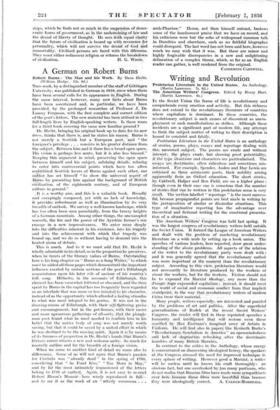A German on Robert- Burns
THIS work, by a distinguished member of the staff of Gottingen University, was published in German in, 1919, since when there have been several calls for its appearance in.-English '.Duting the same interval, however, many new facts about Burns have been ascertained and, in particular, have been Provided, by the prolonged researches of PrOfessor .L 'De Lancey Ferguson, with the first complete and correct edition of the poet's letters. The new material has been utilised in two full-length lives by English-speaking writers. Is. thete room for a third book covering the same now familiar ground Dr. Hecht, bringing his original book up to datefor. its new dress, thinks that there is, and he states his reason. ButriS is not merely a Scottish but a European poet, —and ." the foreigner's privilege . . . consists in his greater distance .from the subject. Between him and it there lies a broad open space. His vision is perhaps less acute, but it is also less biassed." Keeping this argument in mind, preserving the open space between himself and his subject, subduing details; refusing to enter into controversial points which have too often embittered Scottish lovers of Burns against 'each. other, Our atillier, has set himself ‘rt-o show the universal aspect -rif . Burns by presenting him against the background of British Civilisation, of the eighteenth century, and of European culture in general." . .
It is a 'worthy aim, and this is a valuable book. Broadly and sweepingly composed, yet with no lack of knowledge, • it 'provides refreshment as well as illumination- by its- very breadth of outlook. We survey a well-known landscape, which has too often been seen parochially, from the breezy heights of a German mountain. Among other things, the unexampled warmth, the fire and the power of the Ayrshire farmer's don'. emerge in a new impressiveness. We enter more :deeply into the difficulties inherent in his existence, into his tragedy- and into the achievement with which that tragedy, was : bound up, and we do so without having to descend into the heated arena of debate. • „ This is much. And to it we must add that Dr.. Hecht is - wholly admirable in his detail, as in the proportion he. preserves, when lie treats of the literary values of -Burns.-,Outstindirig here is his long chapter on " Burns as a Song Writer," to which must be added all those pages which demonstrate the important influence exerted by certain sections of the poet's Edinburgh acquaintance upon his later role of saviour -Of hiS country's folk song. Hitherto, in the accounts' of Edinburgh, .this element has been somewhat frittered or obscrired, and the time spent by Burns in the capital has too frequently been regarded as an interlude that was more or less inimical .to his character. . instead of as the opportunity which afforded.a lasting stimulus • to what was most integral to his genius, It was not. in the drawing-rooms of Edinburgh, with their. self-flittering praise and encouragement, but in the pot-houses, with their easier and more uproarious gatherings of all-soitS Alit the him poet found . what he most needed to 'confirm him -in his belief' that the native body of song was not merely .worth saving, but that it could be saved by a united effort-in which he was destined to be the moving spirit. Again it is by means of its firmness of proportion in Dr. Hecht's hands that Burnsss literary career attains a new and welcome unity. So much for masterly outline and for the breadth of a foreign vision. .. When we come to another kind of-detail we come also to differences. Some of us Will not agree that'Burns's passion for Clarinda was " already dead " in the spring of 1788, considering that " Ae Fond Kiss," " Nae Morn in May," and by far the most intimately impassioned of the letters belong to 1791 at earliest. Again, it is not easy, to re-read Hobert Heron's Mernair=here wisely reproduced in to see it as the work of an " utterly venomous . . . arch-Pharisee." Heron, not then himself outcast, bestows some of the handsomest praise that we have on record, and his criticisms were but the echo of widespread common talk in Dumfries and elsewhere, such as no faithful biographer could disregard. The last word has not been said- ere, however much we may wish that it was. But these are minor and highly forgivable discrepancies in a new and enlightening delineation of a complex theme, which, so far as an English reader can gather, is well rendered from the original.
CATHERINE CARSWELL.














































 Previous page
Previous page